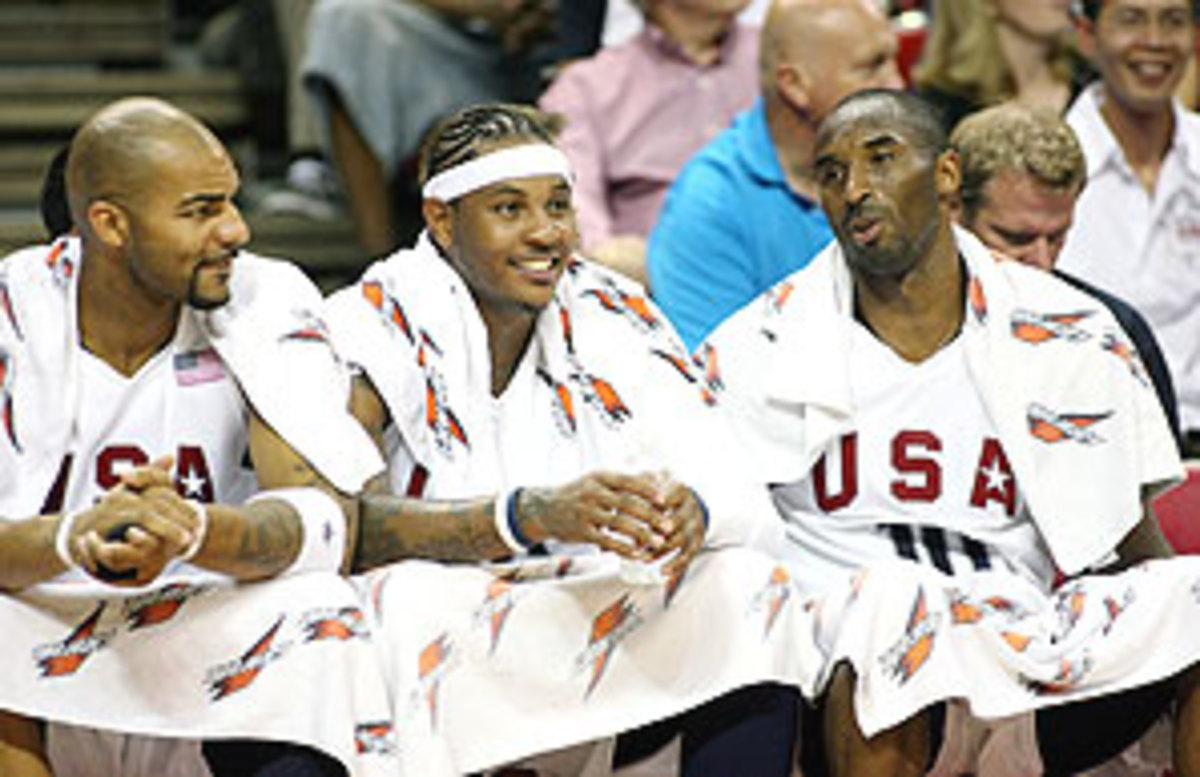Five issues facing Team USA
Friday night's 120-65 pasting of Canada was the U.S.'s 11th consecutive win in Sin City, a record that dates back to last summer when the U.S. won the gold medal at the FIBA America's tournament with a perfect 10-0 record.
But as they pack their passports and head for China, here are five issues that jumped out during the Americans' five-day mini-camp in Vegas.
1. What about the shooting?
Since the 2004 Olympics, when the Americans struggled mightily from the perimeter, shooting has been considered the U.S.'s Achilles heel. But if the last two summers are an indicator, that problem may be solved. The addition of Michael Redd gave the Americans their first pure shooter since Ray Allen in 2000, but there is evidence that the rest of the team is growing more and more comfortable playing from the perimeter. Redd, Carmelo Anthony, Kobe Bryant, LeBron James and Jason Kidd all shot better than 45 percent from beyond the arc last summer. Against Canada, the U.S. shot 50 percent (11-for-22) from three-point range with Redd (6-for-8) leading the charge.
"The strategy [against the U.S.] is to contest shots," said Canada coach Leo Rautins. "But when these guys get hot, it doesn't matter if you contest. They are going to make them."
2. Will their lack of size hurt the U.S.?
Not having another pure center like Brad Miller or Marcus Camby will be a significant problem for the U.S. in Beijing. USA coach Mike Krzyzewski is already planning on using Anthony and James almost exclusively at power forward, leaving Carlos Boozer and Chris Bosh to back up Dwight Howard at center.
Boozer and Bosh are not centers, meaning the U.S. will have difficulty controlling the glass when Howard inevitably runs into foul trouble. Though Krzyzewski said FIBA officials informed him that they would be cracking down on flopping at the Olympics, many foreign players have made falling down an art form. Krzyzewski said he has spoken to his players about watching out for floppers and to "keep their heads" when calls don't go their way
Still, even with Tyson Chandler in the lineup last summer, the U.S. was battered on the boards by teams possessing nowhere near the size of some of the U.S.'s opponents in Beijing. Argentina (which has Luis Scola and played last summer without Fabricio Oberto), Spain (Pau Gasol, Marc Gasol and Jorge Garbajosa), Greece (Sofoklis Schortsanitis, Antonis Fotsis, Yiannis Bourousis), Germany (Chris Kaman, Dirk Nowitzki) and even China (Yao Ming, Yi Jianlian) have enough size to dominate the U.S. on the glass.
It's worth watching.
On the flip side, the commitment to smaller, quicker players should help the U.S. overcome the pick and roll defensive deficiencies that plagued them in 2006, particularly against Greece, which pick-and-rolled them to death on its way to shooting 62.5 percent and knocking the U.S. out of gold medal contention. Krzyzewski said in '06, the U.S. didn't have enough time to prepare an "X's and O's" strategy and in the last two years, Coach K has gone out of his way to seek input from his players on how they prefer to defend the basic play.
3. Is there a potential disaster looming for the United States?
Probably not, but keep an eye on how the U.S. plays early. Four teams from each group advance to the medal round and the U.S., which is in Group B, has a tough early road. More than likely, the U.S., Greece, Spain and Germany will advance with Angola and China as the odd teams out. But watch out for China, who the United States will face in the Olympic opener August 10th. The host nation will be highly motivated and has enough size to give the Americans fits on the inside.
If the unthinkable happens and the U.S. fails to get out of group play, be prepared for calls for a complete overhaul of the program.
4. What should the U.S. be excited about heading to Beijing?
Defense. This is probably the best defensive unit the U.S. has fielded since NBA players began participating in 1992. Bryant, Kidd and Tayshaun Prince are among the best defenders in the world at their position, and Chris Paul led the NBA in steals (2.7 per game) last season.
The intensity of Bryant and Kidd has filtered down, too. Ordinary defenders like James, Redd and Wade have improved significantly since putting on the USA uniform. The U.S.'s ability to defend man-to-man -- and thereby avoid scrambles that result in uncontested shots -- will be critical.
5. So ... after five days with the team, what's your prediction?
Gold: ArgentinaSilver: SpainBronze: USA
I think Rautins said it best Friday night: gone are the days when the U.S. can just assemble an All-Star team and expect to win. USA hoops el jefe Jerry Colangelo has done an admirable job trying to establish continuity with the team. But in the three years he has run the team, only three players -- Anthony, Howard and James -- have played each year.
More than any other competition, Olympic basketball is won through continuity.
"Most of the Olympic teams," said Rautins, "have been playing together for a long time. Greece, Spain, Argentina, these teams have ostensibly been playing together since they got their first look at the '92 Dream Team and fell in love with basketball. It doesn't matter what level of talent the U.S. puts on the floor; until the day comes when 12 NBA stars elect to skip three years of their careers to focus exclusively on international competitions, the U.S. will struggle to compete.
That's not naysaying. That's just the harsh reality of a global game.





